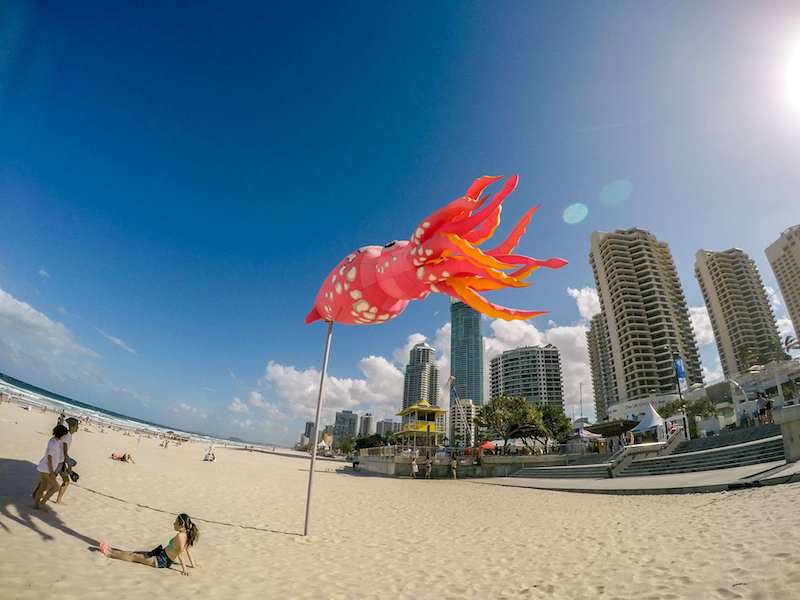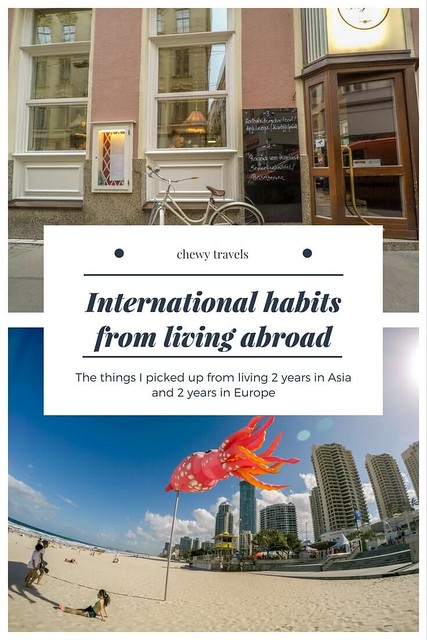International habits I’ve picked up from living abroad for 4 years
They say that you become most like the people that you spend the most time with. What happens when those people are always changing? Or maybe not always changing, but change periodically?
I’ve become an experiment of sorts in this, as over the last few years I’ve been surrounded by a mix of people from different cultures. Living in Asia for 2 years and then Europe for 2 years saw me picking up little habits here and there, some of which I find hard to shake off now that I’m Stateside again.

Where have I been, and where I am now
New York, Singapore, London. These are the places I’ve spent the most time in the last 5 years.
Each an international city in its own right, it’s hard not to pick up bits and pieces from other cultures. Sometimes you don’t notice it’s happened until afterwards, especially if you are acquiring them through osmosis from the people around you.
My friend groups while living abroad have luckily been very diverse, spanning several continents, although with a British slant.
Now that I’m back in New York, I don’t have many international friends, but I’m going to try to find some…
New habits die hard
Humans are creatures of habit. It is known.
How do we form new habits? By doing something often enough for it to become second nature.
Traveling and living in a new country present unique opportunities to do different things, and to be exposed to new information. This can lead to formation of new habits, whether voluntary or out of necessity.
After living in Singapore and London for 2 years each, I acquired a few new habits. Some of these new habits have become old habits, and are still with me.
1. Date format
Nearly everywhere else in the world outside of the USA, people write the date as the day first then the month. If you watch Unbreakable Kimmy Schmidt, there’s an episode where that difference causes some issues.
Why do we do month first? It does look nice when it’s written out, like July 18, 2017. It makes it so that we don’t need to have a number out in front, which could cause problems in formatting for some things.
But other than that, there’s not much logic to it.
When I was living in Singapore and London, I came to prefer the day-month-year format instead of month-day-year. I’ve started to go back to month-day now that I’m back in New York when emailing with friends from here. I’ll switch to day-month when messaging international friends, but I’ll never do this in all numbers, e.g. 12 Sept not 12/9.
2. But not calendar format
In many parts of the world, the weeks on calendars start on Mondays, and not on Sundays like in the US. This means that the calendar will go Monday through Friday and Saturday and Sunday as the last two columns.
I still like my calendars to have the weeks go from Sunday through Saturday. I never could get used to having Monday through Sunday calendars.
I know it makes sense to have Saturday and Sunday next to each other since plans often span over those two days, but I just like the neatness of having the weekends on the actual ends of the week. It’s definitely a mental barrier that is difficult to get over, and I have slid back into embracing it again after being back in the States now for over 6 months. (Holy cow, has it been that long already?!)

3. Metric system…Celsius!!!
Did you know that the British pint is different from the American pint?
WHY CAN’T WE ALL JUST USE METRIC?
Just being able to use all the same measurements would take that confusion out of cross-cultural communications.
Not only would that make sense because everything would work across countries, but also everything in science needs to be in metric anyway so why not just make the full switch.
I’ve also gotten used to all weather temperatures being in Celsius. It makes sense that 0 is freezing.
4. Saying “can”
In Singapore, there is a pigeon language called Singlish that is a mish mash of several languages and customs (many that are shared with Malaysia). It is extremely difficult to understand. Although foreigners may pick up a few phrases, it’s something you have to have grown up around to really understand it.
The Singaporean Society at my university in London put on their version of My Fair Lady, where a Singlish speaking girl learns to speak “proper” English. It was surprising how reminiscent I felt watching the show, even though I don’t speak Singlish.
The simplest, and often most powerful, phrases are single syllable words, which can convey a feeling or give a simple answer to a question.
“Can” is one of those. You can say “can” in response to most questions. It’s presumably short for “I can.” The stranger use of this is when you ask someone if they can or can’t do something, you would say “Can or can not…” The separation of the can and not is emphasized. If a kid didn’t want to go to school, he might say “Can not go to school today?”
This usage might be a result of a direct translation of the word from Chinese to English, as is the case with some other slang in Singapore. This one has been the most useful though, in my opinion.
I usually would only say this in response to questions about whether I was available to do something. It is satisfyingly short and concise. No extra energy, no extra breath required.
I don’t do this to people who wouldn’t know this, so I haven’t used it much since I left Singapore. I did have some Malaysian and Singaporean friends in London who did know.
5. Saying “a bit”
In the United Kingdom, I started saying “a bit” a bit more than I ever had before. The thing with “a bit” is that it can mean “a little” or “kinda a lot.” It depends on your usage, but I think it is meant to be a little ambiguous, in true British style.
I used to say “a little bit” in the past in the situations where I now say “a bit.” It’s nice to have one less word to say, but it feels pretty much the same. I guess it’s just a habit.
In some ways, this added phrase to my lexicon has decreased my usage of “pretty,” which is probably a good thing. It’s one of those words that don’t add much meaning. It’s a filler word. But at least now I have some more diversity in my filler words.

6. Accent immunity
This is not really a habit, but I’ve become more immune to the British accent. I no longer hear it and immediately think, that person must be smart and attractive.
Don’t get me wrong, it can still be cute. But after being exposed to some terrible British reality TV, it’s lost some of its sheen. Scratch that. A lot of its sheen.
I will no longer be held under the spell of a British accent! Irish and Aussie accents, though, that’s another story…
Whatever it may be
Everyone is a work in progress, right? I like how my travels have led to picking up little habits or tweaks in how I express myself. Each addition that feels natural might mean I’m closer to being the fullest and realest version of me.
Do you pick up new habits during your travels? Do they stick with you when you are not traveling?

